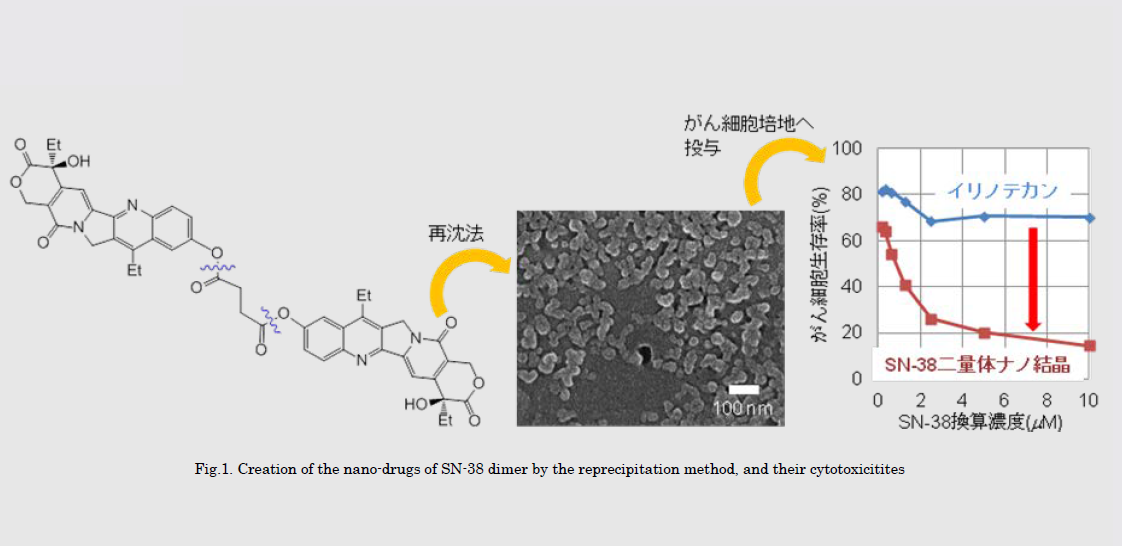
IMRAM
Institute of Multidisciplinary Research for Advanced Materials, Tohoku University
東北大学
多元物質科学研究所

LAST UPDATE 2021/05/09
-
研究者氏名
Researcher Name笠井均 Hitoshi KASAI
教授 Professor -
所属
Affiliation東北大学 多元物質科学研究所
マテリアル・計測ハイブリッド研究センター 有機・バイオナノ材料研究分野
Institute of Multidisciplinary Research for Advanced Materials, Tohoku University
Materials-Measurement Hybrid Research Center, Organic-and Bio-Nanomaterials -
研究キーワード
Research Keywords有機材料化学
有機ナノ結晶
ナノ薬剤
ナノ顔料
Organic materials chemistry
Organic nanomaterials
Nano-drugs
Nano-pigments
- 研究テーマ
Research Subject -
次世代ナノ薬剤の創出
Creation of new generation nano-drugs
研究の背景 Background of the Research
従来の抗腫瘍性薬化合物の設計としては、薬理活性部位を有する化合物に水溶性の置換基を付けたものが一般的であった。ところが、水溶性化合物の場合、血中に移行後、腎臓から濾過されやすい上、正常組織にも拡散しやすい傾向にあり、副作用が出やすいという課題を抱えていた。そこで、高分子のキャリア内部に薬剤を内包し、体内でのデリバリーを行うナノ薬剤がよく研究されているが、近年抗原性や細胞膜透過阻害作用という高分子キャリア自身の問題点が指摘されている。
For the design of the conventional medicine, the drug compounds having the hydrophilic substituents are usually selected. However, in the case of water-soluble drug compounds used for anti-cancer, there are some problems that it is easy for the molecules to be filtered by kidney and mistakenly to attack normal cells, leading to harmful side effects. Therefore, in the past, drug delivery techniques such as the enclosure of drug compounds in small polymer micelles have been well studied, but in late years, the antigenicity called ABC phenonmenon based on the polymer carrier used has been observed.
研究の目標 Research Objective
薬化合物にコレステロール誘導体などの難水溶性置換基を化学的に連結することや2量体化などを施すという従来とは真逆の薬剤設計を遂行すれば、再沈法を駆使することにより、高分子等を添加しないキャリアフリーのDDS用ナノプロドラッグ薬剤を作製できると私は考えている。今後の将来展望としては、腫瘍患部への薬剤移行性の効率を飛躍的に向上させることにより、副作用の低減化がなされた、患者に低負荷となる次世代DDS薬剤の開発の基盤を確立することである。
When the dimer or the water-insoluble compounds with cholesterol derivatives were used as the target drug compounds, the nano-drugs without polymer and so on could be obtained by our original reprecipitation technique. There is no doubt that carrier-free pure nanodrugs (PNDs) that consist exclusively of pharmacologically active compounds will become candidates for use as the next generation of drugs.
研究図Figures

論文発表 / Publications
Angew. Chem. Int. Ed., 51, 10315 –10318 (2012)., Chem. Lett. 42(2013), 900-901., 週刊医学のあゆみ, 247, Vol.2, 196-197 (2013).
研究者連絡先 / HP
- hitoshi.kasai.a6
 tohoku.ac.jp
tohoku.ac.jp - http://www2.tagen.tohoku.ac.jp/lab/kasai/